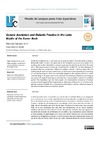Please use this identifier to cite or link to this item:
https://accedacris.ulpgc.es/jspui/handle/10553/70398
| Title: | Generic Ascription and Didactic Practice in the Latin Riddle of the Exeter Book | Authors: | Salvador Bello, Mercedes | UNESCO Clasification: | 570107 Lengua y literatura 550510 Filología |
Keywords: | Exeter Book Riddles Riddle 90 Latin beast poetry Fables Ecbasis captivi, et al |
Issue Date: | 2018 | Journal: | LFE. Revista de Lenguas para Fines Específicos | Abstract: | Riddle 90 constitutes one of the most obscure texts included in the Exeter Book collection. Being fully written in Latin, this piece has so far frustrated a plausible explanation of its puzzling clues to the extent that no convincing answer has been found for it yet. The main aim of this essay however is not to put forward another solution for the long catalogue of proposals that has already been offered by scholars. Instead, I will here argue that the relative lack of viable solutions comes from the fact that this text issued from a reworking of a school beast poem, which was awkwardly adapted to the enigmatic format. A better understanding of this poem can thus be attained if its rhetorical components and imagery are read in the light of beast poetry deriving from classical fables used in the medieval period. This hypothesis can also help explain the overemphatic occurrence of textual elements that are typical of the enigmatic genre. This essay will therefore try to demonstrate that the contents of Riddle 90 are reminiscent of this literary tradition, which developed in the school context of the early medieval period. La Adivinanza 90, única composición en latín incluida en el Exeter Book, es un enigma de por sí. Hasta la fecha no ha sido imposible ofrecer una explicación plausible de sus extrañas pistas, de manera que no se ha encontrado todavía una solución convincente para ella. El objetivo principal de este ensayo no es, sin embargo, añadir una nueva solución más a la larga lista de propuestas que ya ha tenido lugar. La razón principal es que, creo, que este texto no es una adivinanza sino más bien una reelaboración de un poema bestiario medieval, que procede de la práctica escolar. Aunque está bastante claro que algunos de los elementos textuales de la Adivinanza 90 son afines a las carateríscticas que se observan en otros acertijos, se puede llegar a una mejor comprensión del poema si sus componentes retóricos y sus imágenes se analizan a la luz de la poesía bestiaria medieval, que deriva a su vez de las fábulas clásicas. Este artículo, por tanto, intentará demostrar que los contenidos de la Adivinanza 90 son reminiscentes de esta tradición literaria, que se desarrolló en el contexto escolar del periodo medieval temprano. |
URI: | https://accedacris.ulpgc.es/handle/10553/70398 | ISSN: | 1133-1127 | DOI: | 10.20420/rlfe.2018.236 | Source: | LFE. Revista de lenguas para fines específicos [eISSN 2340-8561], v. 24 (2), p. 92-106 |
| Appears in Collections: | Artículos |
Page view(s)
35
checked on Jan 10, 2026
Download(s)
58
checked on Jan 10, 2026
Google ScholarTM
Check
Altmetric
Share
Export metadata
Items in accedaCRIS are protected by copyright, with all rights reserved, unless otherwise indicated.
